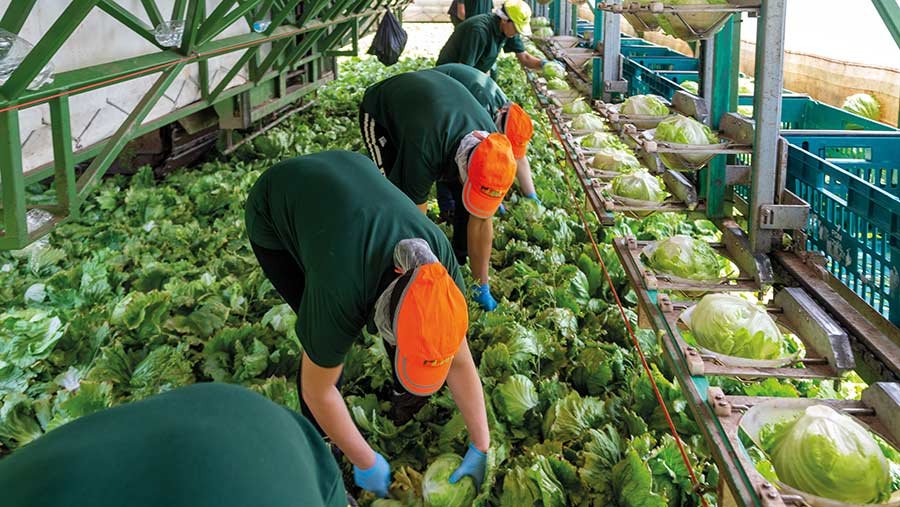With robotic pickers and packers many years away for most commercial horticulture businesses and labour availability falling dramatically, the industry is on the verge of a crisis.
Industry leaders want the Home Office to act now to increase the seasonal worker quota for 2023 to avert a disaster for UK fruit and veg businesses.
See also: MPs told to act now to expand seasonal farmworker numbers
Innovation
NFU president Minette Batters spent a Sunday in Shropshire last month seeing farmworkers harvest iceberg lettuces and cut spinach.
New Defra secretary Ranil Jayawardena, was also invited, but as Mrs Batters told delegates at a recent NFU fringe event at the Conservative Party conference, the minister arrived late and did not see the iceberg lettuce rig.
“This is really what he needed to see,” she said.
The farm visited on 25 September belongs to third-generation farmers Phil and Liz Maddocks.
They own PDM Produce, a family-run grower and producer of whole head and prepared salads, which are supplied to a range of UK grocers and supermarkets.
PDM was founded in 1991 and is one of the UK’s most innovative prepared salad businesses, and is home to the UK’s first vertically integrated, fully prepared bagged salad operations.
If Mr Jayawardena had made it on time, he would have been able to witness the huge levels of investment that the sector has really delivered on, said Mrs Batters.
“That rig had nine people in it, picking 10 iceberg lettuces every 60 seconds,” she stressed.
“That’s a phenomenal efficiency. But you still need the dexterity of the human hand – you can’t fully automate it yet.”
Mrs Batters fed back this “big message” to the secretary of state – the horticulture industry is making great strides to increase innovation in the sector, but manual labour remains essential.
Automation
The impact of falling labour availability has been demonstrated in a survey carried out by British Berry Growers (formerly British Summer Fruits) in November 2021.
This found that, since 2019, there has been an annual 37-40% drop in the number of EU nationals working in the berry industry – from 33,763 in 2019, to an estimated 10,578 in 2022.
Annual fruit wastage due to this lack of pickers almost doubled from £18.7m in 2020 to £36.5m in 2021, the survey revealed.
Nick Marston, chairman of British Berry Growers, which represents 95% of all the UK’s commercial soft fruit growers, said this highlighted the sector’s reliance on seasonal labour – and this would be the case for at least another decade.
“If you look at anything that can be practically automated, growers have already done it,” he said.
“For instance, strawberry production is almost exclusively grown in substrate on tabletops. Pickers are almost twice as productive than they were when they were picking on the ground.”
But as for robots replacing humans in berry production, Mr Marston said this was “still a long way off”.
The researchers working on robotics hope to have machines that are effective in five years’ time. These will then have to be manufactured to replace a workforce in the berry industry, he explained.
“You are talking about an awful lot of equipment. All of that must be at least 10 years away.”
UK workforce
Nick Marston of British Berry Growers says home secretary Suella Braverman is “misguided” if she believes Brits can plug the workforce gap on UK berry farms.
UK residents made up about 8% of the workforce during the first Covid lockdown, but this promptly fell to about 0.5% as soon as all the other sectors reopened, he said.
According to Mr Marston, the proportion of UK workers in the seasonal berry industry has been falling for years, mainly because seasonal work is by definition less attractive than full-time work for people living in the UK.
“When you need to raise a family, pay a mortgage or buy a house, why would you take a job that ends in the autumn when you might have a permanent job you would hope to be for years?” he asked.
Jack Ward, chief executive of the British Growers Association, agrees that the home secretary and the Home Office are “fundamentally wrong” if they think the labour shortfall in the horticulture sector can be plugged by British workers.
“Private businesses take these people on and spend a disproportionate amount of money managing them and listening to their excuses – why they couldn’t get out of bed, or why they were late for work,” he said.
Seasonal visas
With the current Seasonal Worker Scheme (SWS) due to expire in 2024, British Berry Growers wants the government to replace it with a five-year rolling scheme and extend the period of seasonal visas from six to nine months.
This would give horticulture businesses confidence to invest in production and continue to harvest crops. “Defra boasted about increasing the scheme to 40,000 workers in 2022, but actually 2,000 of these went to the poultry sector,” said Mr Marston.
“Horticulture needs at least 60,000 seasonal workers in 2023 and people are short of staff. A lot of crops were wasted this year because we didn’t have the people.”
A spokesman for the Home Office said the government is committed to ensuring the immigration system works for business and encourages highly skilled people and high-growth businesses to choose to locate and invest in the UK.
The government will set out a plan in the coming weeks “to ensure the immigration system supports growth whilst maintaining control”.
But Mr Ward rejects claims that the SWS is adding to immigration figures.
“This is not an immigration issue, this is a seasonal worker issue,” he said. “People come here and work, then they go home. They have no intention of staying here.”
Visa requirements
Since Brexit, many EU nationals have returned home or gone to work in other countries.
Many who do return to the UK are attracted by jobs in other industries such as hospitality, the food services and tourism, rather than horticulture.
EU nationals also need to be granted settled or pre-settled status under the EU Settlement Scheme to work in the UK without a visa.
This scheme will expire in 2025, when all workers from the EU will lose the right to enter the UK to work without a visa under pre-settled status.
Thereafter, anyone from the EU or elsewhere who wants to come to work in the UK will require a visa, as are all new recruits to the UK workforce from the EU already.
The Seasonal Worker Scheme (SWS) has provided some leeway, granting six-month temporary visas for up to 40,000 people wanting to work in horticulture or poultry.
Cap on numbers
But reports of a split between prime minister Liz Truss and the Home Office on the future direction of the SWS emerged last week.
During her campaign to become Conservative Party leader, Ms Truss said “we need to expand this scheme”.
According to The Times, Ms Truss has told cabinet ministers she wants to expand it by 20,000 workers, which would raise the cap to up 60,000 seasonal workers.
But home secretary Suella Braverman is understood to be opposed to raising the cap.
She told a fringe meeting at the Conservative Party conference that farmers must end their “reliance” on cheap foreign labour and replace them with domestic workers and automation.
The Home Office certainly has been taking a hard line on migration issues.
Recent attempts to ease control in Scotland, with a bespoke scheme for remote areas, triggered a firm rebuttal.
Instead, it pointed out that “rural areas [in Scotland] may struggle to retain migrants for the same reasons as with the local population.
Investment in jobs and infrastructure – which devolved administrations have powers to address – must be considered.”
Case study: Anthony Snell, Herefordshire
Soft fruit grower Anthony Snell says it is “totally unreasonable” for home secretary Suella Braverman to insist farming must reduce its reliance on workers from abroad.
He warns that tighter restrictions on seasonal migrant staff would “severely damage” the horticulture sector.
Mr Snell and his wife, Christine, grow 1,000t of strawberries, plus raspberries, blackberries, blueberries and blackcurrants on their farm south of Herefordshire.
The site has a 2,000t-capacity packhouse, plus a 1,000-pallet freezer store.
Anthony Snell with early season strawberries © Anthony Snell
The business employs 250 seasonal workers each year, who stay for the maximum six months. The workers are recruited via Concordia, Pro-Force and Fruitful.
Mr Snell says it has always been a struggle to recruit staff due to availability, but they have so far managed to fill their requirements each year.
The grower says the Seasonal Worker Scheme should be expanded, adding that there is no substitution for well-trained and hard-working workers from abroad.
“Robotics have been developed, but one robot works as much as one worker and is expensive and definitely not the answer,” he says.
“The scheme is positive for the economy and a vital requirement for more UK production and less-sustainable imports.”
Mr Snell added: “We try to support domestic workers where there is availability, but they don’t want to work from 5am, which we have to do in hot summers such as 2022.”












